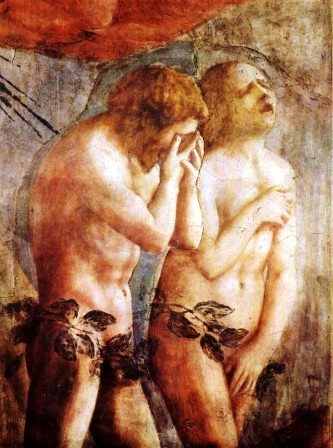Dying, He Shall Die
James Jordan’s paper on capital punishment begins with the very first threat of death in history. The rest of the Bible shows us that the curse was subtly paired with a promise of a more abundant life:
The first instance of capital punishment in the Bible is found in Genesis 2 and 3. God told Adam regarding the fruit of the Tree of Knowledge of Good and Evil, ” from the tree of the knowledge of good and evil you shall not eat from it, for in the day that you eat from it, dying you shall die [you shall most certainly die]” (Gen. 2:17).
For reasons that I have set out elsewhere, I believe that the Tree of Knowledge had to do with elevation to a position of judicial “godhood.” Man was created in God’s image, but was not created mature. He was to grow in God’s likeness, and eventually would be invested with the responsibility of passing judgments on good and evil, just as God had passed such judgments in Genesis One. Since God had created every tree without exception for man to eat of (Gen. -1:29), it was clear to Adam that the prohibition on the Tree of Knowledge was only temporary. [1]
The statement that man would most certainly die in the day he ate of the fruit can be taken in two ways, both probably correct. First, if man disobeyed God and seized the fruit prematurely, he would be sentenced to death. This is indeed what happened, except that an animal was slain as a substitute for Adam’s death, and all Adam suffered on that day was a mitigated form of death: banishment.
Second, if Adam had not sinned, then in time God would have given him permission to eat of the Tree of Knowledge. This would have brought with it a transition from a lower to a higher estate and condition of life. It is pictured for us in the transfiguration of our Lord, and in the nature of His resurrection body. Such a transition would entail and eventuate in a thorough- going transformation of the human person: a form of death. Thus, it is possible to see God’s statement in Genesis 2:17 as both warning and promise.
I do not mean that Adam would have received a transfigured body at the point of eating the fruit of the Tree of Knowledge, any more than we receive transfigured/resurrected bodies at the point of our salvation. But, just as our perseverance/preservation in the Kingdom is assured by salvation, so Adam’s eventual transfiguration would have been assured by the Tree of Knowledge. Just as we die to a lesser life and enter a fuller one at the point of salvation, so Adam would have experienced a transition, from immaturity to maturity, from servant to king, at the point of eating the Tree of Knowledge. Just as the most important transition (death) for us is Spiritual conversion, not corporeal death, so the most important transition (“death”) for Adam would have been his eating of the Tree of Knowledge, not his eventual transfiguration into a new corporeal state. Since in the transfigured body they neither marry nor are given in marriage, Adam’s transfiguration would have come after his years of earthly rule and procreation.
_______________________________
[1] See James B. Jordan, “Rebellion, Tyranny, and Dominion in the Book of Genesis,” in Gary North, ed., Tactics of Christian Resistance. Christianity & Civilization No.3 (Tyler, TX: Geneva Ministries, 1983).
[2] James B. Jordan, The Death Penalty in the Mosaic Law, 1989. Available from www.biblicalhorizons.com


























